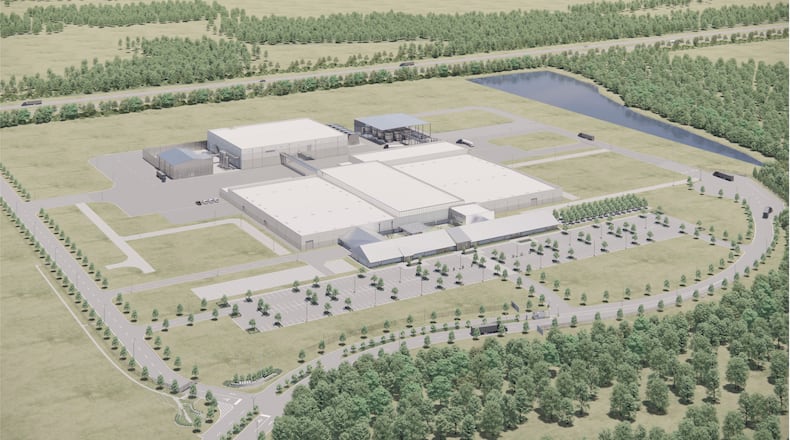Fires from electric vehicle batteries are rare, but when they do occur, the same energy-dense materials that allow a car to run for hundreds of miles on a single charge can create white-hot infernos that are difficult to extinguish.
Now, a company seeking to make materials for preventing such runaway conflagrations at a new factory in southeast Georgia is set to get funding from the U.S. Department of Energy.
On Wednesday, the DOE’s Loan Programs Office announced a commitment to offer Massachusetts-based Aspen Aerogels a $671 million loan to build its newest factory near Register, Georgia, about 12 miles outside of Statesboro.
The company says the facility, which has already broken ground, will employ about 550 workers during construction and has promised to create 250 permanent manufacturing jobs when it opens in 2027.
Aspen plans to produce its trademarked PyroThin thermal barriers at the factory, which the company says help prevent or at least slow the chain-reaction that causes most EV fires.
The lithium-ion batteries used in most EVs are packed tightly with thousands of individual cells. But if one of those cells is compromised and catches fire, it can spread rapidly to adjacent ones, creating a dangerous condition known as “thermal runaway.” The PyroThin barriers provide “optimal protection against thermal propagation” and help improve EV battery range, Aspen says.
“Aspen’s solutions not only meet this need, but Aspen is a strong, debt-worthy company that is well positioned to repay this loan,” a company spokesperson added.
Credit: David Shopper Photography
Credit: David Shopper Photography
Aspen has already inked multiyear deals to supply barriers to major EV and battery companies, including General Motors, Toyota, Scania, Audi and Automotive Cells Company, which is backed by Stellantis, Mercedes-Benz and the French battery company Saft. The company is fulfilling those commitments with barriers produced at its existing Rhode Island factory, but the Georgia facility will allow it to meet expected future demand growth.
An Aspen spokesperson said the company does not have agreements in place to supply barriers to Hyundai Motor Group, which recently began production at its hulking, $7.6 billion Metaplant America in nearby Bryan County, but said it views the growing EV ecosystem in Georgia as “positive.”
The DOE’s loan is contingent on the company meeting certain “technical, legal, environmental, and financial conditions,” but the precise terms were not available.
The financing is being offered through the agency’s Advanced Technology Vehicles Manufacturing Loan Program, which has lent support to several major EV projects over the years, including Tesla’s Fremont, California, plant and Nissan’s middle Tennessee factories. But Jigar Shah, the director of the DOE’s Loan Programs Office, said the conditional loan commitment to Aspen is the agency’s first for a thermal barrier maker.
Shah said he feels confident that lending to Aspen is a good use of taxpayer funds.
“They fit the fact pattern we like to see, which is that they have been making this technology for some time, and so we know that it works,” Shah said. “So, we’re not taking technology risk — what we’re really taking is a scale-up and execution risk.”
Supporting Aspen also fits the Biden-Harris administration’s aims to grow U.S. manufacturing, build domestic supply chains and curb climate change, the DOE said. The agency estimates the new Register factory will produce enough thermal barriers for 2 million vehicle batteries annually, creating fuel savings equal to taking more than 5,000 gas-powered vehicles off the road each year.
Aspen is not the first major energy or manufacturing project in Georgia to receive DOE backing.
In August, the DOE issued a conditional, $1.45 billion loan to the solar panel manufacturer Qcells to aid its completion of a second Georgia factory, which is nearing completion in Cartersville, about 50 minutes northwest of Atlanta. The long-delayed and over-budget expansion of the Plant Vogtle nuclear energy site near Augusta was bolstered by $12 billion in loan guarantees from the DOE.
Earlier this month, the AJC reported Rivian has applied for a DOE loan of its own to help finance the $5 billion EV plant it wants to build an hour east of Atlanta. The company pressed pause on the project in March, but has stressed its commitment to building its next factory in Georgia. Cox Enterprises, which owns The Atlanta Journal-Constitution, also owns about a 3% stake in Rivian.
A note of disclosure
This coverage is supported by a partnership with Green South Foundation and Journalism Funding Partners. You can learn more and support our climate reporting by donating at ajc.com/donate/climate.
About the Author
Keep Reading
The Latest
Featured





